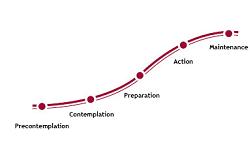The 5 Stages Of Change
 How people move from one entrenched behavior to another has fascinated psychologists for a long time. The question is also important in addiction treatment, where the change sought is breaking a powerful habit. The question, “How can I help someone change their ways?” turns out to be best answered by looking at where someone is in the process – techniques useful in one step might not be applicable to another. Here are the five stages in order with the treatment goals for each.
How people move from one entrenched behavior to another has fascinated psychologists for a long time. The question is also important in addiction treatment, where the change sought is breaking a powerful habit. The question, “How can I help someone change their ways?” turns out to be best answered by looking at where someone is in the process – techniques useful in one step might not be applicable to another. Here are the five stages in order with the treatment goals for each.
- Precontemplation – The “not ready” stage. Here, someone isn’t really considering changing their behavior. Therapy would attempt to show the problems they are having and linking those problems to the addiction.
- Contemplation – Called the “thinking about it stage.” While not yet focused on practical methods, the patient is at least considering what it would mean to live without the addiction. This is encouraged by getting them to explore what their addiction means and what it would be like to be healthy instead.
- Preparation/planning – This stage is a “get ready” with a clear goal to quit in the near future. Therapists will try to make the quit date and plan as concrete as possible by helping meet objections and preparing the addict for what is to come.
- Action – This is the follow-up to the plan where stopping actually happens. To stick with their commitment, patients should be encouraged and reminded of their goals and reasons for quitting.
- Maintenance – One of the most difficult stages, maintenance requires an ongoing battle to stick with the new behavior and keep the old away. Fighting temptation and reinforcing the positive aspects of the new way of living is the focus here.
These are the five main stages, but two others are sometimes mentioned as part of the process. The first is relapse, which can occur at any point and means slipping back into a previous stage. The second is a “transcendental” stage that is the result of long term, successful maintenance. With the transcendental step, addicts are no longer expending much effort to keep their behavior under control. In this last stage, the new behavior/habit has become the norm and for all intents and purposes, change is complete.